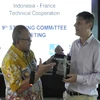ASEAN leaders and economic scholars have agreed on the need to enhance regional connectivity intensively and extensively to create a buffer for external shocks and adverse impacts.
Thai Prime Minister Yingluck Shinawatra told the World Economic Forum on East Asia in Bangkok on June 1 that connectivity has become more crucial amid challenges from the euro-zone crisis, climate change and others.
Asia must continue to promote regional cooperation and integration, she said.
Vietnamese Prime Minister Nguyen Tan Dung said ASEAN+3 and other mechanisms will open up a space for discussion on policies to support growth and build up immunity to external shocks.
He proposed further cooperation on the development of economic corridors, physical infrastructure, regulations, preparation for disasters, efficient use of water resources and solutions to the East Sea issue.
Lao Prime Minister Thongsing Thammavong said his country has already seen the benefits of greater connectivity and called for closer cooperation among governments.
Indonesian President Susilo Bambang Yudhoyono said during the integration process, the bloc’s ten nations will play an increasingly important role to the global economy.
ASEAN nations should coordinate to improve the connectivity in transport, trade, energy, information technology, banking, education and food security.
ASEAN needs to lift the current barriers to consolidate relations, heading towards sustainable development, Susilo Bambang Yudhoyono said.
Idris Jala, Malaysia's Minister to the Prime Minister's Office urged the creation of an agreement among ASEAN nations on how to respond to financial and non-financial crises effectively.-VNA
Thai Prime Minister Yingluck Shinawatra told the World Economic Forum on East Asia in Bangkok on June 1 that connectivity has become more crucial amid challenges from the euro-zone crisis, climate change and others.
Asia must continue to promote regional cooperation and integration, she said.
Vietnamese Prime Minister Nguyen Tan Dung said ASEAN+3 and other mechanisms will open up a space for discussion on policies to support growth and build up immunity to external shocks.
He proposed further cooperation on the development of economic corridors, physical infrastructure, regulations, preparation for disasters, efficient use of water resources and solutions to the East Sea issue.
Lao Prime Minister Thongsing Thammavong said his country has already seen the benefits of greater connectivity and called for closer cooperation among governments.
Indonesian President Susilo Bambang Yudhoyono said during the integration process, the bloc’s ten nations will play an increasingly important role to the global economy.
ASEAN nations should coordinate to improve the connectivity in transport, trade, energy, information technology, banking, education and food security.
ASEAN needs to lift the current barriers to consolidate relations, heading towards sustainable development, Susilo Bambang Yudhoyono said.
Idris Jala, Malaysia's Minister to the Prime Minister's Office urged the creation of an agreement among ASEAN nations on how to respond to financial and non-financial crises effectively.-VNA



















